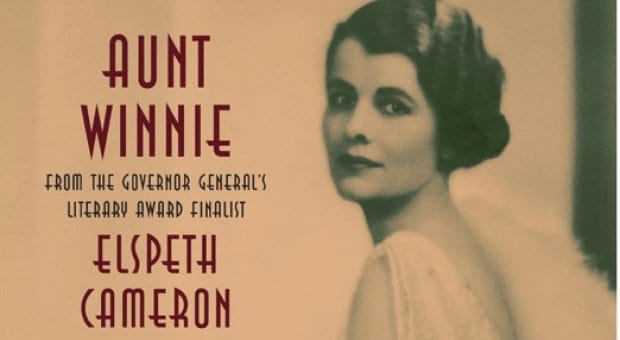What would a biography of somebody who did not bother accomplishing anything look like? Elspeth Cameron’s latest book, Aunt Winnie, documenting her own aunt’s uneventful life of easy privilege, is very probably it. Though conveyed against the vivid backdrop of the entrenchment of the Scottish and English industrialist and banking elites of Toronto and their social ways, the book follows the author’s aunt, Winifred Cameron, not doing much at all with the opportunities given, other than enjoy nature, shop and read about the royal family.
“For me, it is the process of discovering how a person became whatever they became that is fascinating. True, in Winnie’s case, it’s more what she didn’t become,” Cameron explains. “I suppose I set myself a very difficult challenge: to write about someone who accomplished almost nothing in her life, by the usual standards. But the lives of such people truly interest me.” Winnie was the only child of a highly prosperous family for 11 years before her brother Donald — the author’s father — was born. The mother was passive, possibly depressed, the father always away, so Winnie reigned in the household unchallenged. (Donald and Winnie continued to not get along until the day that she died.) She was registered at the private all-girls Bishop Strachan School, but her attendance was sporadic and she eventually dropped out. Since she didn’t have any economic urgency to marry, she never did.
Cameron isn’t at all sentimental about her favourite aunt. “Winnie was lazy, self-indulgent and allowed to get away with avoiding school. I believe she was not very intelligent and certainly did not have an inquiring mind.” I ask her if it may be that a high degree of easy inherited privilege makes somebody less alert to the world, less questioning about what matters in life, and therefore thwarts their potentials. “I would agree. Whatever potential for anything Winnie had just lay dormant. It neither rose to her consciousness, nor was it drawn out of her by her parents. I suppose Winnie had a bad case of affluenza.” Although Winnie came into contact with many women of her own generation and older who, indeed, did have interests and talents (Winnie’s own great-aunt, who had a career in singing, or her friend later in life, Judge Emily Murphy), their life choices obviously did not register as possibilities — or attractions.
But there was more to Winnie than her socialite ways. “She had given me a map for relaxing and for showing physical affection,” Cameron writes near the end of the book. Winnie comes across as the affectionate aunt to her favourite niece and as somebody who was quick to supplement whatever she perceived was lacking in the parenting her niece was receiving. “Winnie’s emotions were more ‘sound’ and natural than those of many people,” Cameron says. “Her capacity for joy, grief, excitement, disappointment were completely appropriate. My parents were uncomfortable with emotion and with physical affection, even to each other. I think Dr Spock comes into this, too. He believed you shouldn’t hold babies too much as they might become spoiled. So, hugs and kisses were on short order at home. Nonexistent, really. I know that Winnie’s affection to me made it possible for me to be a very affectionate parent.”
To hope that Winnie would have understood Cameron’s love of women might be going too far, however. The literary biographer and author of several books on Canadian cultural figures famously came out with the 1997 memoir No Previous Experience, which documents her falling in love with another woman and the dissolution of her third marriage. What would Winnie have said of all that, had she been around to witness it? “She wouldn’t have had a clue what I was talking about. Like Queen Victoria, she believed that lesbians couldn’t exist . . . [Later in life] Winnie lived downstairs from a homosexual without ever putting two and two together: the stream of young men and boys visiting, and the sound effects.”
Aunt Winnie is published by Cormorant Books.

 Why you can trust Xtra
Why you can trust Xtra


